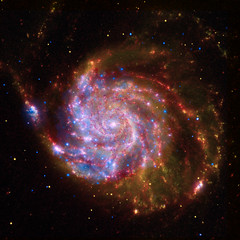After Five Years, NASA's Aura Shines Brightly - NASA Jet Propulsion Laboratory
Posted using ShareThis
July 16, 2009
July 11, 2009
Astronomy in the Philippines
Astronomy is one of the basic sciences that were still unexplored here in the
Granted, the importance of astronomy in the Philippine setting is quite low. I think that it was the reason why no one (or maybe few) in the government ever focus its attention in improving the awareness of the people. And I definitely agree that the government faces even more important problems that need their full focus.
PAG-ASA
The Philippine Atmospheric Geophysical and Astronomical Services Administration (PAG-ASA) is the sole government entity who is commissioned to provide awareness to the people about astronomy. Sadly, due to more important priorities like weather and other natural disasters occurring in the country, it only focuses its limited budget to weather forecasting. Again, I totally agree with them. It’s the right thing to do.
The Good News
Though astronomy in the Philippines is generally poor, there are still reasons to rejoice. Though lacking unity, there are a lot of scattered private organizations in the country that promote awareness about the science of heavenly bodies. These groups consist of professional and amateur astronomers, students, and other astronomy enthusiasts. It’s very nice to know that the interest of the Filipinos on astronomy is not absolutely empty.
Also, the Rizal Technological University of the Philippines (RTU) became the first educational institution to offer the first ever astronomy college course in the country. Though the initial enrollees on the Bachelor of Science (BS) in Astronomy Technology are just few, it is a signal that the celestial science in the country is off to a good start. They also offer Masters of Science in Astronomy for those who want to take up Masters Degree.
Authors Note
It seems like astronomy in the Philippines is getting the right push. This year 2009 was declared as the International Year of Astronomy (IYA2009). Its mission is to help the citizen in the world (including us, Filipinos) rediscover its place in the universe through day and night time sky and thereby engage a personal sense of wonder and discovery. It’s very nice to know that the Philippines is one of the active nations on the program 100 Hours of Astronomy (100HA).
Yes, though it may not have direct effects as other sciences have on Filipino lives, no one could dispute the fact that astronomy has an impact on the world we live in.
This blog is dedicated to provide some ideas on astronomy not only in the Philippines but on the entire globe.
External Readings
http://www.astronomy2009.ph
http://www.astroleaguephils.org
 Image by Getty Images via Daylife
Image by Getty Images via Daylife
Granted, the importance of astronomy in the Philippine setting is quite low. I think that it was the reason why no one (or maybe few) in the government ever focus its attention in improving the awareness of the people. And I definitely agree that the government faces even more important problems that need their full focus.
PAG-ASA
The Philippine Atmospheric Geophysical and Astronomical Services Administration (PAG-ASA) is the sole government entity who is commissioned to provide awareness to the people about astronomy. Sadly, due to more important priorities like weather and other natural disasters occurring in the country, it only focuses its limited budget to weather forecasting. Again, I totally agree with them. It’s the right thing to do.
The Good News
 Image by Smithsonian Institution via Flickr
Image by Smithsonian Institution via Flickr
Though astronomy in the Philippines is generally poor, there are still reasons to rejoice. Though lacking unity, there are a lot of scattered private organizations in the country that promote awareness about the science of heavenly bodies. These groups consist of professional and amateur astronomers, students, and other astronomy enthusiasts. It’s very nice to know that the interest of the Filipinos on astronomy is not absolutely empty.
Also, the Rizal Technological University of the Philippines (RTU) became the first educational institution to offer the first ever astronomy college course in the country. Though the initial enrollees on the Bachelor of Science (BS) in Astronomy Technology are just few, it is a signal that the celestial science in the country is off to a good start. They also offer Masters of Science in Astronomy for those who want to take up Masters Degree.
Authors Note
It seems like astronomy in the Philippines is getting the right push. This year 2009 was declared as the International Year of Astronomy (IYA2009). Its mission is to help the citizen in the world (including us, Filipinos) rediscover its place in the universe through day and night time sky and thereby engage a personal sense of wonder and discovery. It’s very nice to know that the Philippines is one of the active nations on the program 100 Hours of Astronomy (100HA).
Yes, though it may not have direct effects as other sciences have on Filipino lives, no one could dispute the fact that astronomy has an impact on the world we live in.
This blog is dedicated to provide some ideas on astronomy not only in the Philippines but on the entire globe.
External Readings
http://www.astronomy2009.ph
http://www.astroleaguephils.org
July 1, 2009
2009-International Year of Astronomy
2009 is the International Year of Astronomy. This is also the year I decided to come back to who I am ten years ago.
The heavens is calling me back...I cannot refuse...
The heavens is calling me back...I cannot refuse...

Please join me in rediscovering the fantastic world of astronomy. Let's explore the universe and be drowned with awe and reverence to its Creator.
Subscribe to:
Comments (Atom)
![Reblog this post [with Zemanta]](http://img.zemanta.com/reblog_e.png?x-id=ea2b1a78-2453-4f2d-802a-9a35d5ffa11f)